Ulyanov's Tweets Reflect Greater Optimism In Iran Nuclear Talks
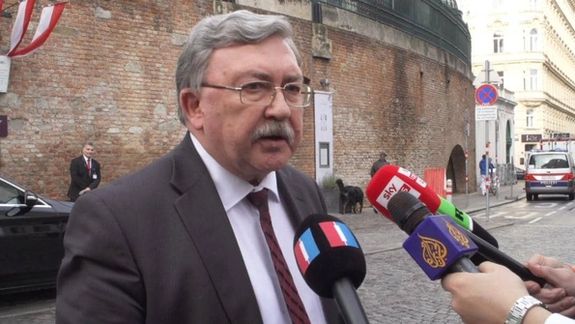
Mikhail Ulyanov, Russia’s lead negotiator in the Vienna talks on Iran’s nuclear program, tweeted twice Friday to signal progress.

Mikhail Ulyanov, Russia’s lead negotiator in the Vienna talks on Iran’s nuclear program, tweeted twice Friday to signal progress.
At 1.13pm, he posted a photo across a table from Robert Malley hailing “another very useful meeting” with the United States Special Envoy on Iran and noting “we are definitely moving ahead.”
At 4.13pm Ulyanov sent out a second tweet, with a photo across the table from Enrique Mora, the senior European Union official chairing talks among world powers seeking to revive the JCPOA, the 2015 agreement limiting Iran’s nuclear program from which President Donald Trump withdrew the US in 2018.
Ulyanov wrote he had had “in-depth discussion” with Mora on what “a final document …may look like.” Ulyanov had previously expressed optimism that this could be done by the end of February.
A final document would contain details of which sanctions the United States would lift as incompatible with the JCPOA and exactly how the Iranian nuclear program, expanded and developed since 2019, would be returned to JCPOA limits. It would also be expected to contain a timetable for ‘sequencing’ such moves.
Western European negotiators in recent days have also said they are more hopeful. The lead United Kingdom negotiator and director for Middle East and North African affairs Stephanie Al-Qaq tweeted Thurday that her meeting with Iran’s lead negotiator Deputy Foreign Minister Ali Bagheri Kani and Mora has seen a “constructive exchange.”
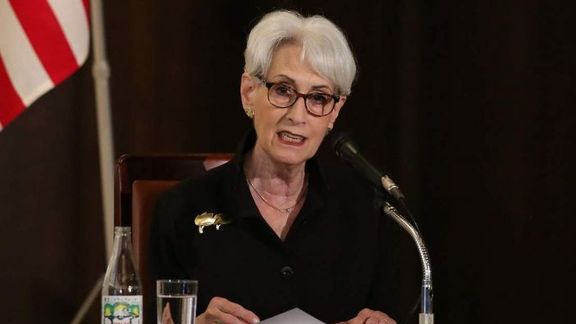
Faced with increasing pressure from Republicans, US Deputy Secretary of State Wendy Sherman, has denied that Iran has the upper hand in Vienna nuclear talks.
In an interview with MSNBC Thursday, Wendy Sherman – who was closely involved in negotiating the 2015 agreement, the JCPOA (Joint Comprehensive Plan of Action) – said “all options” were on the table regardless of what happened in Vienna. Other administration officials have portrayed reviving the JCPOA was an alternative to military confrontation.
"We're not going to [just] accept anything Iran has to offer,” Sherman said. “We will re-enter the JCPOA in its fullness if Iran maintains compliance with it. And all of our options always remain on the table, regardless of what gets chosen here."
Politicians in Tehran have increasingly highlighted Iran’s surviving the ‘maximum pressure’ sanctions imposed by the US since 2018 – with the economy returning to growth after two years’ deep recession and oil exports slowly increasingsanctions still officially in force.
Some Iranian media have also detected an upper hand in the expansion of the nuclear program, including enrichment up to 60 percent, since 2019. Foreign Minister Hossein Amir-Abdollahian who has been under attack recently domestic opponents, said February 5 that talks in Vienna would be "seriously continued with full hands."
Saeed Jalili, a former nuclear negotiator and a JCPOA opponent, tweeted on February 8:“They [the US] were saying that Iran’s oil exports should reach zero, while after three years we are selling 1.2 million barrels per day… and this volume is increasing,”
Sherman’s interview came as opponents of the JCPOA in Washington stepped up attacks on the Biden administration. In a letter to President Joe Biden earlier this week, Republican senators led by Ted Cruz argued Congress should review any ‘new’ deal. Administration officials have pointed out they aim to revive an existing agreement that Republican president Donald Trump left in 2018 without approval from Congress.
Nuclear arsenal
"As a result of President Biden's weakness and appeasement, this administration is ramping up to give a nuclear arsenal to the Ayatollah in Iran," Cruz said in the Senate February 7.
US supporters of reviving the deal have argued that Iran’s nuclear program, which was limited by the JCPOA, has expanded since Trump stormed out of the agreement and imposed ‘maximum pressure,’ and that continued expansion of the nuclear program outside the JCPOA risks military confrontation with Israel or the United States.
President Ebrahim Raisi reiterated Friday that Iran was pinning no hopes on reviving the JCPOA and had confidence in its own abilities and resources. Both Raisi and predecessor President Hassan Rouhani have consistently argued that despite ‘maximum pressure’ Iran will not accept demands beyond the terms of the JCPOA.
Negotiators in Vienna have said the talks may be nearing agreement. In a tweet Thursday, Mikhail Ulyanov, Russia's lead negotiator, suggested the process was at"the final stage. German Foreign Minister Annalena Baerbock said Thursday in Tel Aviv she was “convinced that a full restoration of the JCPOA would make the region more secure, including Israel.”
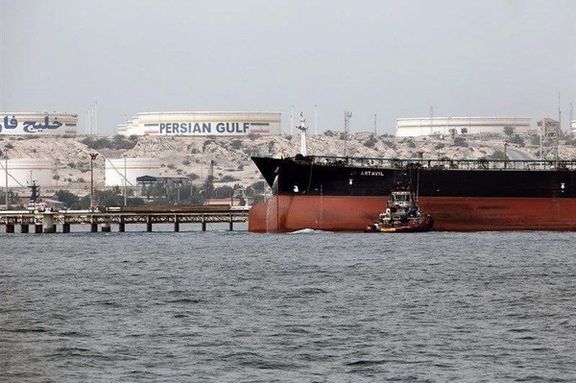
More reports from industry sources confirm that Iran’s oil exports have risen despite US sanctions, as each side tries to build leverage in nuclear talks.
Reuters reported on February 10 that in the past two months daily shipments have surpassed one million barrels a day, the highest since May 2019, when the Trump administration cancelled waivers allowing eight countries to import limited quantities of Iranian oil.
Between May 2019 and late 2020, Iran’s clandestine oil exports hovered around 200,000 bpd, or 10 percent of its sales before Donald Trump withdrew from the Iran nuclear agreement, JCPOA, and imposed sanctions.
However, around the time of US presidential elections in the fall of 2020, reports emerged that Iran had increased shipments to more than half a million barrels per day.
This coincided with the time when candidate Joe Biden announced his decision to reverse Trump’s policy of ‘maximum pressure’ against Iran and start negotiations to revive the JCPOA.
The latest news about higher exports, reported by Reuters quoting industry sources, coincide with the most critical phase of indirect nuclear talks the Biden Administration started with Iran more than 10 months ago. The talks held in Vienna involve all the signatories of the JCPOA, including China that is widely believed to be the biggest customer of Iran’s illicit exports.
The Chinese government that mostly abided by the sanctions, increasingly shows defiance to the Biden Administration. A spokesman responded to questions about its oil imports by Reuters, implicitly confirming and challenging the sanctions.
The "international community, including China, has been conducting normal cooperation with Iran under the global legal framework, which are both reasonable and legitimate. They deserve respect and safeguard," the spokesperson's office of China's Foreign Ministry said.
Tehran clings to these sort positions by China and Russia in order to demand more in Vienna, and Iranian hardliners tell domestic audiences that Tehran is in a strong position and does need to compromise.
Saeed Jalili a former nuclear negotiator and an opponent of the JCPOA tweeted on February 8, before the latest reports, “They were saying that Iran’s oil exports should reach zero, while after three years we are selling 1.2 million barrels pd…and this volume is increasing.”
This is a sign of how more oil exports strengthen the hand of hardliners who oppose any compromise with the United States and push for expansion of the nuclear program.
In another tweet, Jalili posted a video of a speech to supporters of the Iranian regime, in which he says the US policy of pressuring Iran has failed and uses a clip from the State Department spokesperson, Ned Price declaring the sanctions policy as an utter failure, to prove to the public that there is no fear and Iran should stand tall.
American proponents of a tough policy toward Iran accuse the administration of abandoning sanctions enforcement amid nuclear talks and allowing Iran to increase oil exports, which could harm their own leverage in Vienna.
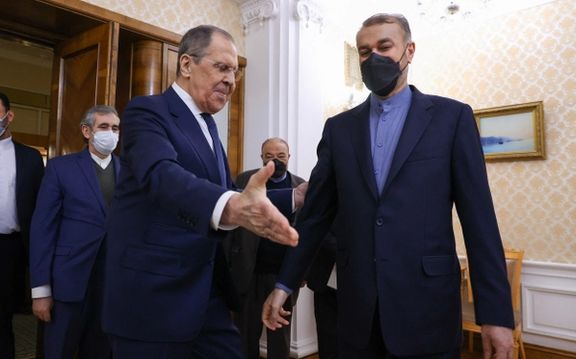
Russia has said there is still a long way to go in the Vienna talks before the 2015 nuclear deal between Iran and world powers can be revived.
According to Reuters, Foreign Minister Sergei Lavrov made the remarks on Thursday as indirect talks between Tehran and Washington to salvage the deal resumed on Tuesday after a 10-day break.
Although the negotiating teams in Vienna give little away as to whether they are closer to resolving the thorny issues, Lavrov’s comment is in contradiction to that of Mikhail Ulyanov, Russia’s lead negotiator and its ambassador to the International Atomic Energy Agency, who said the talks were “five minutes” from the finish line.
“A draft of the final document has been crafted,” he said. “There are several points there that need more work, but that document is already on the table.”
Reiterating Iran’s demand that the US remove all sanctions imposed under ‘maximum pressure’ since 2018 when the Trump administration left the 2015 deal (the JCPOA, Joint Comprehensive Plan of Action), Foreign Minister Hossein Amir-Abdollahian said Monday that “the latest texts obtained from the Vienna talks” failed to address “parts of our demands for the lifting of sanctions.”
Rob Malley, the White House Iran envoy leading the American team taking part indirectly in Vienna, told the MSNBC Friday that negotiators had not reached agreement on central issues, such as exactly which US sanctions should be lifted.
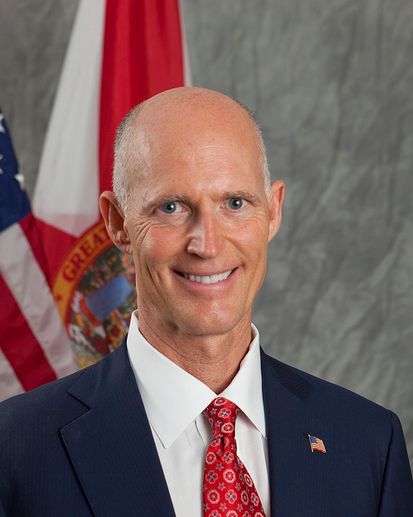
US Senator Rick Scott (R-Florida) said Wednesday that Iran foments unrest in the Mideast and should not have nuclear weapons and the JCPOA “is a horrible deal.”
Answering questions by Iran International TV, Sen. Scott said, “I believe Iran's whole focus is on unrest, supporting Hezbollah, Hamas, threatening Israel, and it's despicable. I don't believe they should have a nuclear weapon. I think the Iran deal is a horrible deal. ”
As talks in Vienna to revive the Obama-era JCPOA reach what diplomats say its final stage, Republican and some Democratic lawmakers are voicing concern about the Biden Administration strategy in the talks.
An agreement with Iran “should be treated as a treaty and come in front of the Congress; we have to review it. But the Biden admin is a bunch of appeasers...I'd do everything I can to stop them...,” Scott said.
Thirty-three Republican Senators wrote to President Joe Biden on Monday saying that if an agreement with Iran does not get bipartisan support and Senate approval, it will be torn up if they win in 2024. Democratic Senator Bob Menendez also last week questioned Biden’s Iran policy last week in a detailed speech on the Senate floor.
“We in Congress can pass legislation that takes away authority of the executive branch in making a decision, but the truth is they don't have the authority. This deal needs to come back to Congress and should never be done by executive branch by themselves,” Scott reiterated on Wednesday.

The White House publicly pressured Iran on Wednesday to revive the 2015 Iran nuclear agreement quickly, saying only a few weeks remain to restore the deal.
"Our talks with Iran have reached an urgent point," White House spokeswoman Jen Psaki told reporters, noting that the US special envoy for Iran, Rob Malley, has returned to Vienna for indirect talks with Iran on both sides resuming compliance with the pact.
"A deal that addresses the core concerns of all sides is in sight, but if it's not reached in the coming weeks Iran's ongoing nuclear advances will make it impossible for us to return to the JCPOA," she said, referring to the deal by the acronym for its official name, the Joint Comprehensive Plan of Action.
Psaki's comments echoed those of a senior U.S. State Department official who told reporters on Jan. 31 that "we only have a handful of weeks left" to revive the agreement.
Under the accord, Iran restricted its nuclear program to make it harder to obtain the fissile material to make a bomb. In return, the United States and other nations eased sanctions that have crippled Iran's economy.
Former US President Donald Trump abandoned the deal in 2018, arguing that it had failed to stop Iran's support for regional proxies and gave Tehran too much sanctions relief for the nuclear restrictions. He then restored U.S. sanctions, prompting Iran to begin violating the deal's nuclear limits a year later.
Reporting by Reuters